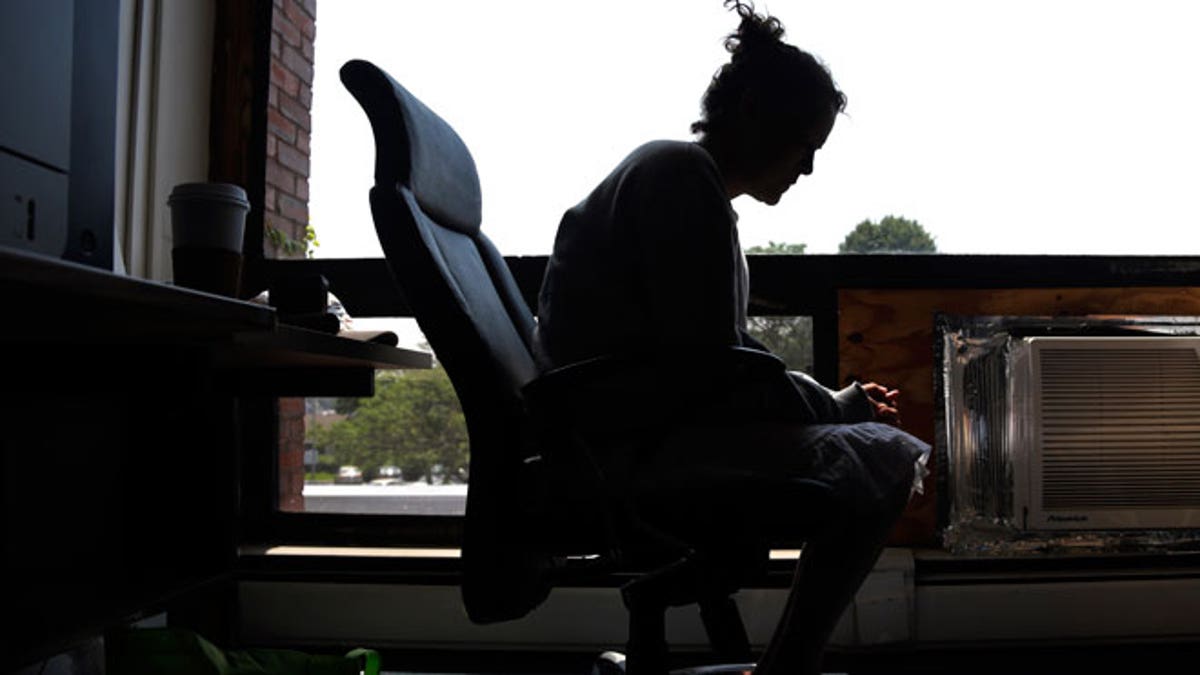
In this July 10, 2015, photo, a woman speaks to The Associated Press inside the police station in Gloucester, Mass. The woman voluntarily came to the police for help kicking her heroin addiction. Gloucester is taking a novel approach to the war on drugs, making the police station a first stop for addicts on the road to recovery. Addicts can turn in their drugs to police, no questions asked, and officers, volunteers and trained clinicians help connect them with detox and treatment services. (AP Photo/Elise Amendola)
The young woman nursing a fresh black eye has come to the police station in this old fishing city for help. But she's not looking to report a crime or seek someone's arrest. She wants help kicking her heroin addiction.
"It was better than the alternative," says the woman, in her mid-20s, as she waits wearily for her ride to a detox center, following a long night that involved a stint in the emergency room, wrestling with the early pains of withdrawal and, finally, sleep in a police holding cell. "I just knew if I was let go, I'd just go out and use."
Gloucester is taking a novel approach to the war on drugs, making the police station a first stop for addicts on the road to recovery.
Under a policy launched in June, heroin and opioid addicts who voluntarily turn themselves in at the station are fast-tracked into treatment services through a team of police officers, volunteers and trained clinicians.
They aren't charged with a crime, and much of their treatment cost is covered through public and private insurance, grants by service providers and by police using money seized from drug dealers.
They can even hand over drugs and drug paraphernalia to police, no questions asked.
As of Friday, police say 109 addicts have turned themselves in seeking help, 16 percent of them hailing from out of state and about 70 percent of them men. All have been placed into drug treatment programs at a total cost of about $5,000 to the department.
The policy, which experts say is unique in the country, has thrust this city roughly 40 miles north of Boston into the debate over what role police should play in a national heroin epidemic that has hit New England particularly hard.
"It's the next logical step in the so-called war on drugs," says Gloucester Police Chief Leonard Campanello, a former narcotics officer who launched the effort. "We need to change the conversation."
Police departments across the country are testing new approaches. Select officers in Seattle, for example, are allowed to redirect low-level drug and prostitution offenders into treatment rather than arresting them and sending them to jail.
"Jail does nothing to help them stop abusing drugs," says Darrel Stephens, executive director of the Major Cities Chiefs Association.
Nationally, heroin-related overdose deaths nearly doubled from 2011 to 2013, when more than 8,200 people died, according to recent data from the Centers for Disease Control and Prevention. In Massachusetts, an estimated 939 residents died from heroin and other opioid-related overdoses in 2013 - five of them in Gloucester, the state says.
The city's efforts have not gone unnoticed.
A nonprofit has been founded to support the program and export its ideas to other communities, some of which are already starting to come up with their own Gloucester-inspired efforts.
"Traditionally, law enforcement has tried to arrest their way out of the problem," says Dan Langloss, police chief in Dixon, Illinois, who announced this week his department and the county sheriff's office are adopting Gloucester's model starting Sept. 1. "That just doesn't work."
Still, questions remain.
The lead prosecutor for the Gloucester area has warned police they may lack legal authority to promise addicts they won't be charged. And treatment providers wonder what an influx of patients might mean for an already strained system.
"If several other communities adopted the same practice, it could overwhelm the existing capacity," says Chuck Faris, CEO at Spectrum Health Systems, a Massachusetts substance abuse treatment provider that's taken in about 35 Gloucester-referred patients to date.
It's been a busy three days for Gloucester's program when The Associated Press drops in for a visit one Friday in July.
The young woman, whose name the AP is withholding because she alleges sexual abuse as well as domestic violence by her boyfriend, is the last of six addicts who have come through the station doors in a roughly 30-hour span.
"I know this isn't the life I want to live," says the Massachusetts native and college graduate. "I just didn't know how to get out."
The woman says she landed at the police station after spending three days living on the street and shooting heroin.
She eventually called a relative, who had heard about the Gloucester program and drove her to the police station. The woman wasn't charged with a crime; she says she asked to stay overnight until a detox bed opened up.
Building trust with addicts is just a piece of the puzzle, Campanello says.
His department is working with pharmacies to provide discounted naloxone, an overdose-reversal drug, and pushing federal authorities to designate some of the money seized from drug dealers for treatment programs, as Gloucester does.
The chief also wants to focus attention on what he sees as barriers to treatment within the health care industry.
"I think the question to ask is why is a police department in northeastern Massachusetts placing people into treatment? And if we can, why can't the traditional methods do it?"
